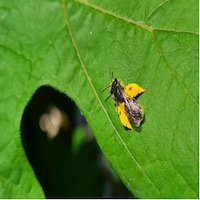Globally forests provide an important environmental and ecological resource, first by acting as carbon sinks as well as providing food, clean water, habitat for humans and shelter for many other species. Recent European reports stress the vulnerability of forest ecosystems, especially under the threat of climate crisis. Since Cyprus is located in the south of Europe, it is expected to be impacted more by the effects of climate crisis, for example forest degradation, desertification, low air quality and water shortage. EU is setting targets to reduce carbon emission and consequently mitigate the effects of climate crisis. Even though negative impacts are predicted and are expected to severely affect the south Mediterranean, Cyprus was included in the worst-performing countries regarding EU carbon emission’s targets of 2020.
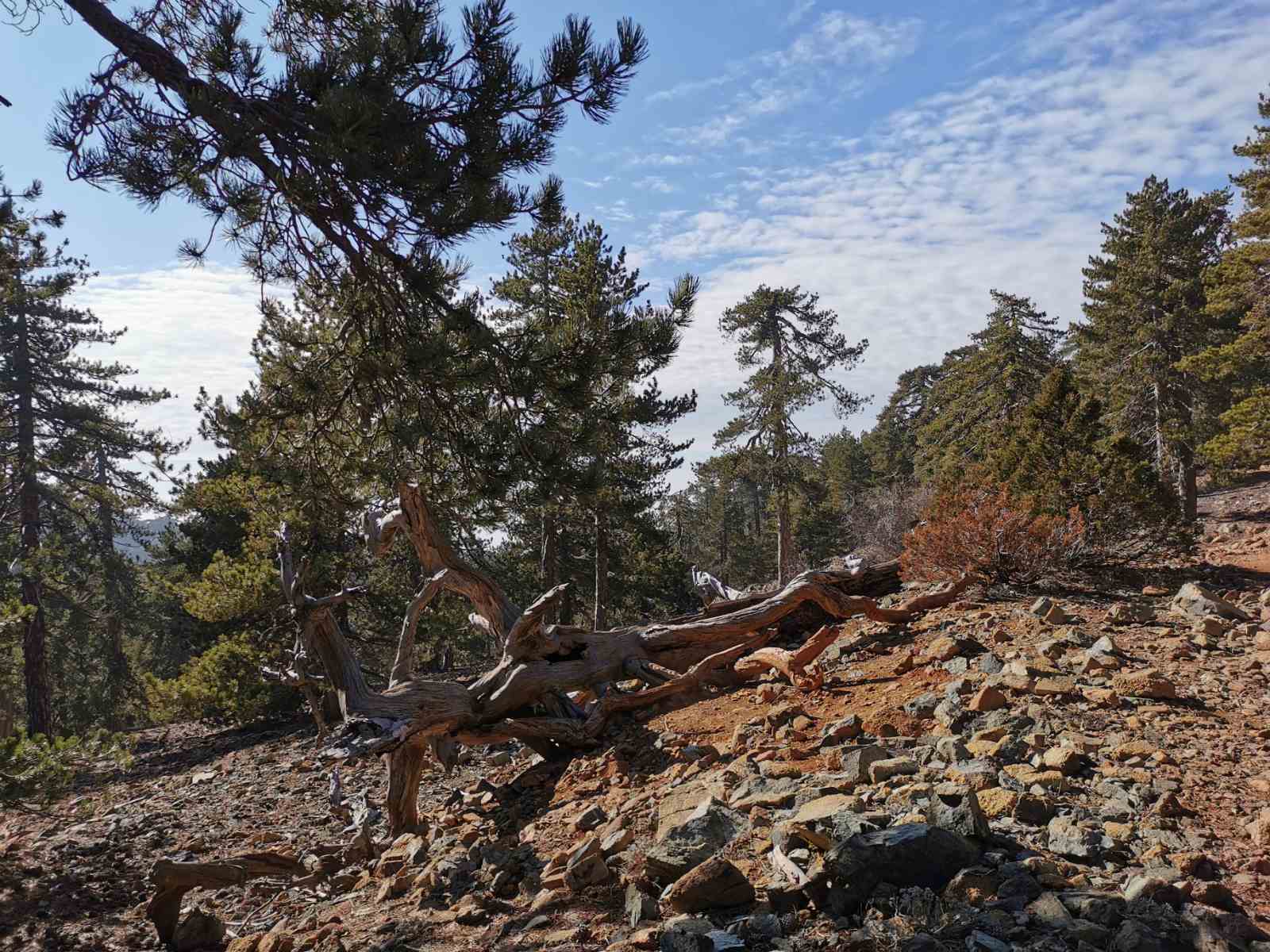 Recent reports stressed the vulnerability of the forest ecosystem in the European Union (EU), especially to the south, with impacts associated to climate change including incidence of pests, higher possibilities of forest fires, risk of coniferous forests decline and worsening the problem of invading species. Furthermore, drought events are expected to become more frequent and last longer in the Mediterranean region, weaking forest strands and leading to pest outbreaks.
Recent reports stressed the vulnerability of the forest ecosystem in the European Union (EU), especially to the south, with impacts associated to climate change including incidence of pests, higher possibilities of forest fires, risk of coniferous forests decline and worsening the problem of invading species. Furthermore, drought events are expected to become more frequent and last longer in the Mediterranean region, weaking forest strands and leading to pest outbreaks.
The study presented below focuses on whether Cypriot residents understand and observe the effects of the climate change on Cypriot forests. Analysing what people believe about climate crisis is extremely important for developing effective educational and communication approaches, as well as establishing and implementing national policies. Knowing whether people have observed forest degradation as an effect of climate crisis, is critical for promoting robust, tailored, acceptable and effective mitigation policies aiming to tackle the effects of climate crisis.
The following series of results, as presented at the scientific paper “Do People Understand and Observe the Effects of Climate Crisis on Forests? The Case Study of Cyprus” published at MDPI Forest journal (https://www.mdpi.com/1999-4907/12/9/1152/htm). The results were acquired using tailored questionnaires. In total, 416 questionnaires were completed by Cypriot residents.
The effects of climate change on forests are visual to the public. A remarkable percentage of 65.6% of participants stated that they noticed moderate, much or very much degradation on Cypriot Pine forests, and specifically indicated observed forest degradation including trees dying, stressed trees, increased fire events, reduced soil moisture (drought), desertification and difficulties in forest regenerating itself.
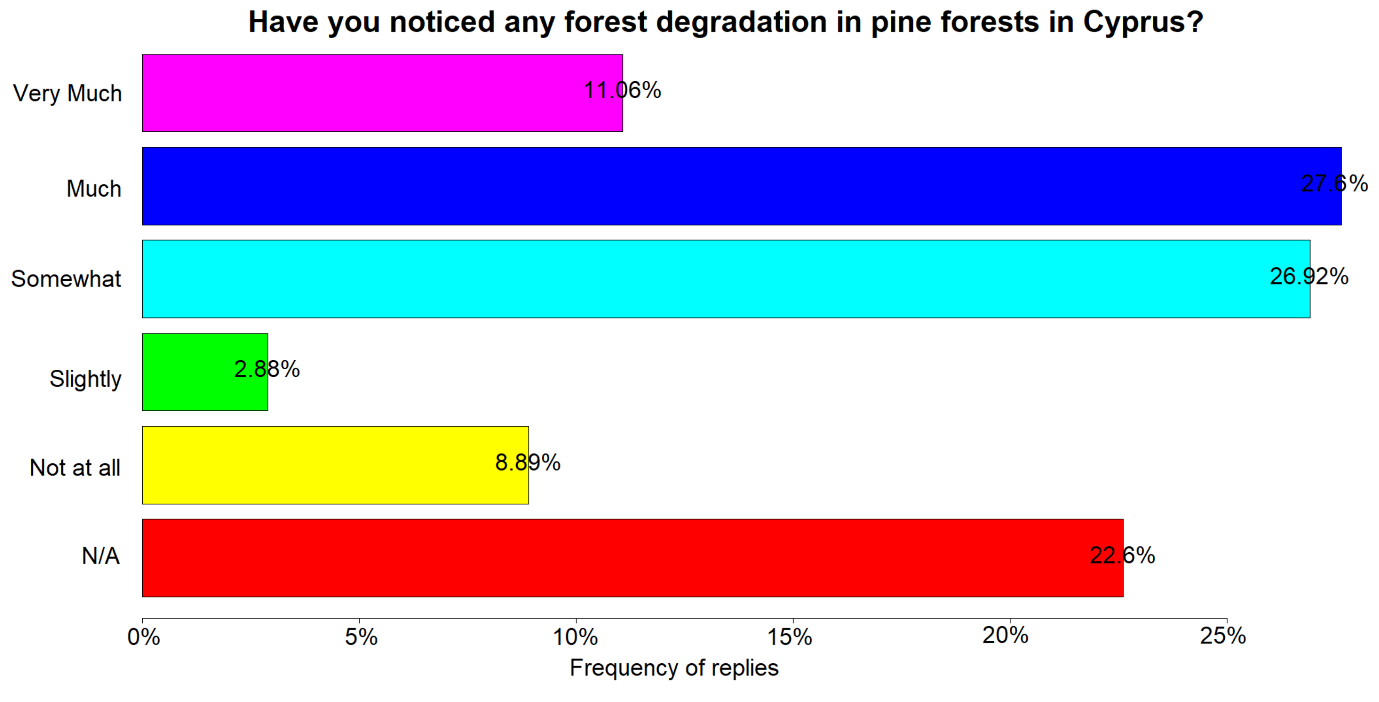
Participants ranked which Cypriot Forest has been mostly affected by climate crisis according to their opinion, with all forested areas in Cyprus receiving a significant number of votes. More specifically, Akamas Forest ranked first and Troodos Forest second. The questionnaire was disseminated after Akamas forest has suffered from multiple fires events (mainly arson acts as indicated by the Forestry Department), with drought conditions spreading these fires easier and making them more difficult to extinguish. In Troodos forest, conservation of Black pine (Pinus Nigra) is under pressure due to warmer weather conditions and competition from other species such as the Calabrian Pine (Pinus Brutia).
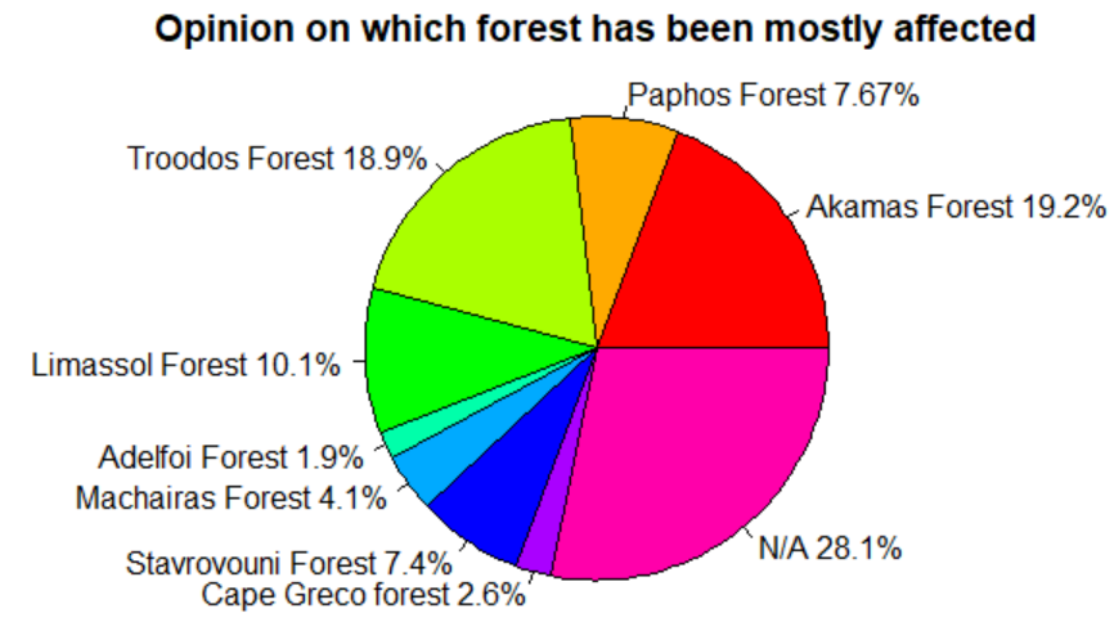
Furthermore, the participants believe that coniferous species (e.g., pines) are the most threatened type of forested species. As aforementioned, the Black Pine is under stress and expected to suffer due to climate crisis, while the Calabrian Pine is favoured and invading the habitat space of the Black pine.
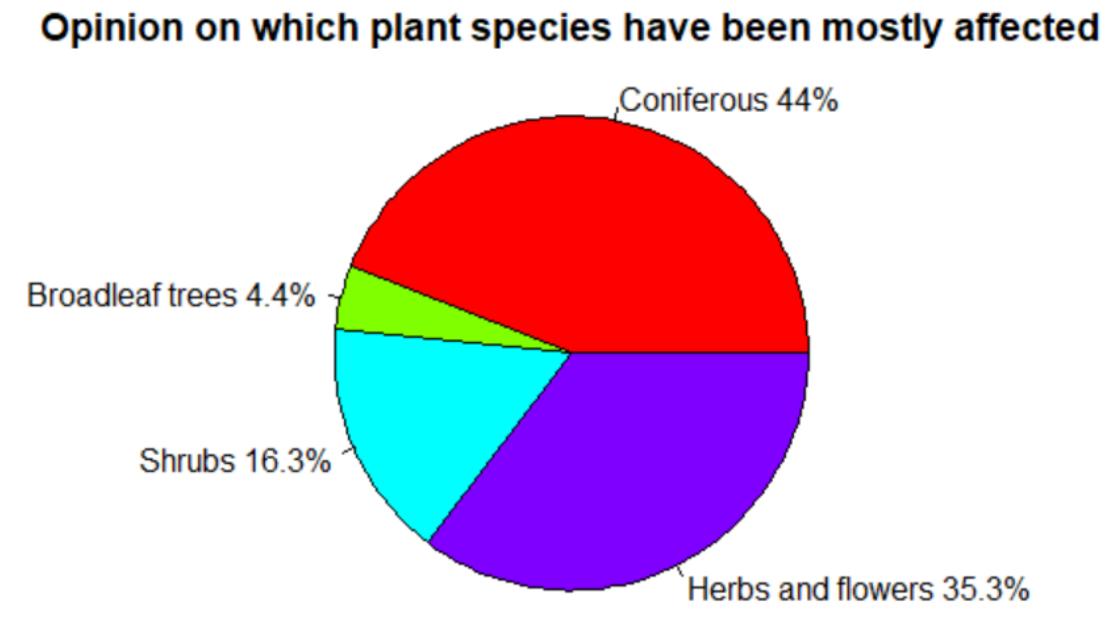
This study further showed that employed people were more likely to believe in climate crisis and observe its effect in forest degradation. Overall, unemployed people were more convinced that climate change is perceived in Cyprus, but they were less likely to believe in its importance, notice forest degradation, believe that phenomena are affecting us now and will affect us in the future. This indicate that beliefs aligned with climate crisis confer increased employability.
Higher level of education correlates with increased importance of climate change (i.e., the more educated was someone, the more likely was to believe in the importance of climate change), but there was no apparent relationship between observing forest degradation and level of education. Participants that work at non-profit organisations (NGOs) were 71.43% likely to have noticed pine forest degradation, 33.87% more likely than non-NGO employees.
Older participants (55+) believe that climate change has not been perceived enough in Cyprus, while in comparison to the younger populations, older participants are more convinced that phenomena like prolonged period of high temperatures and more intense heatwaves are important and affect us in the present. Additionally, older participants have observed the most forest degradation in Cyprus.
The results of this study is particularly important, since it shows that people see the effects of climate change in forests. A large percentage (65.62%) of Cypriot residents noticed degradation on Cyprus coniferous forests, and indicated degradation as tree die backs, decreased soil moisture, and difficulty in degeneration. Cypriot residents identified Akamas forest as the most threatened forest from climate change and have indicated that coniferous pine forests are mostly affected by the effects of climate change. People can observe climate change phenomena something that was not possible ten years ago. There is also an indication that people whose beliefs are aligned with climate change are more employable that people who do not believe in the importance of climate change. People’s perceptions and observations are of crucial importance in developing localised national policies and effective educational and communication approaches to mitigate the effects of climate change especially on forest degradation.
This research is conducted at the Geodesy Lab, Civil Engineering and Geomatics of Cyprus University of Technology (CUT) in collaboration with Friends of the Earth (Cyprus). It is part of the ASTARTE"(EXCELLENCE/0918/0341) project, which ultimate goal is to understand how Cypriot forests changes over time using satellite imagery. It is co-financed by the European Regional Development Fund and the Republic of Cyprus through the Research Innovation Foundation.
Related Scientific Article: https://www.mdpi.com/1999-4907/12/9/1152/htm
Authors: Dr Milto Miltiadou, Efrosyni Antoniou, Natasa Ioannou, Christos Theocharidis, Dr Chris Danezis
Twitter: @DrMiltiadou, @FoECyprus, @C_Theocharidis, @danezis
Website of project: astarte.cut.ac.cy
Στο ΤΕΠΑΚ το αρχείο «Έλλης και Πανίκου Παιονίδου»
Globally forests provide an important environmental and ecological resource, first by acting as carbon sinks as well as providing food, clean water, habitat for humans and shelter for many other species. Recent European reports stress the vulnerability of forest ecosystems, especially under the threat of climate crisis. Since Cyprus is located in the south of Europe, it is expected to be impacted more by the effects of climate crisis, for example forest degradation, desertification, low air quality and water shortage. EU is setting targets to reduce carbon emission and consequently mitigate the effects of climate crisis. Even though negative impacts are predicted and are expected to severely affect the south Mediterranean, Cyprus was included in the worst-performing countries regarding EU carbon emission’s targets of 2020.
 Recent reports stressed the vulnerability of the forest ecosystem in the European Union (EU), especially to the south, with impacts associated to climate change including incidence of pests, higher possibilities of forest fires, risk of coniferous forests decline and worsening the problem of invading species. Furthermore, drought events are expected to become more frequent and last longer in the Mediterranean region, weaking forest strands and leading to pest outbreaks.
Recent reports stressed the vulnerability of the forest ecosystem in the European Union (EU), especially to the south, with impacts associated to climate change including incidence of pests, higher possibilities of forest fires, risk of coniferous forests decline and worsening the problem of invading species. Furthermore, drought events are expected to become more frequent and last longer in the Mediterranean region, weaking forest strands and leading to pest outbreaks.
The study presented below focuses on whether Cypriot residents understand and observe the effects of the climate change on Cypriot forests. Analysing what people believe about climate crisis is extremely important for developing effective educational and communication approaches, as well as establishing and implementing national policies. Knowing whether people have observed forest degradation as an effect of climate crisis, is critical for promoting robust, tailored, acceptable and effective mitigation policies aiming to tackle the effects of climate crisis.
The following series of results, as presented at the scientific paper “Do People Understand and Observe the Effects of Climate Crisis on Forests? The Case Study of Cyprus” published at MDPI Forest journal (https://www.mdpi.com/1999-4907/12/9/1152/htm). The results were acquired using tailored questionnaires. In total, 416 questionnaires were completed by Cypriot residents.
The effects of climate change on forests are visual to the public. A remarkable percentage of 65.6% of participants stated that they noticed moderate, much or very much degradation on Cypriot Pine forests, and specifically indicated observed forest degradation including trees dying, stressed trees, increased fire events, reduced soil moisture (drought), desertification and difficulties in forest regenerating itself.

Participants ranked which Cypriot Forest has been mostly affected by climate crisis according to their opinion, with all forested areas in Cyprus receiving a significant number of votes. More specifically, Akamas Forest ranked first and Troodos Forest second. The questionnaire was disseminated after Akamas forest has suffered from multiple fires events (mainly arson acts as indicated by the Forestry Department), with drought conditions spreading these fires easier and making them more difficult to extinguish. In Troodos forest, conservation of Black pine (Pinus Nigra) is under pressure due to warmer weather conditions and competition from other species such as the Calabrian Pine (Pinus Brutia).

Furthermore, the participants believe that coniferous species (e.g., pines) are the most threatened type of forested species. As aforementioned, the Black Pine is under stress and expected to suffer due to climate crisis, while the Calabrian Pine is favoured and invading the habitat space of the Black pine.

This study further showed that employed people were more likely to believe in climate crisis and observe its effect in forest degradation. Overall, unemployed people were more convinced that climate change is perceived in Cyprus, but they were less likely to believe in its importance, notice forest degradation, believe that phenomena are affecting us now and will affect us in the future. This indicate that beliefs aligned with climate crisis confer increased employability.
Higher level of education correlates with increased importance of climate change (i.e., the more educated was someone, the more likely was to believe in the importance of climate change), but there was no apparent relationship between observing forest degradation and level of education. Participants that work at non-profit organisations (NGOs) were 71.43% likely to have noticed pine forest degradation, 33.87% more likely than non-NGO employees.
Older participants (55+) believe that climate change has not been perceived enough in Cyprus, while in comparison to the younger populations, older participants are more convinced that phenomena like prolonged period of high temperatures and more intense heatwaves are important and affect us in the present. Additionally, older participants have observed the most forest degradation in Cyprus.
The results of this study is particularly important, since it shows that people see the effects of climate change in forests. A large percentage (65.62%) of Cypriot residents noticed degradation on Cyprus coniferous forests, and indicated degradation as tree die backs, decreased soil moisture, and difficulty in degeneration. Cypriot residents identified Akamas forest as the most threatened forest from climate change and have indicated that coniferous pine forests are mostly affected by the effects of climate change. People can observe climate change phenomena something that was not possible ten years ago. There is also an indication that people whose beliefs are aligned with climate change are more employable that people who do not believe in the importance of climate change. People’s perceptions and observations are of crucial importance in developing localised national policies and effective educational and communication approaches to mitigate the effects of climate change especially on forest degradation.
This research is conducted at the Geodesy Lab, Civil Engineering and Geomatics of Cyprus University of Technology (CUT) in collaboration with Friends of the Earth (Cyprus). It is part of the ASTARTE"(EXCELLENCE/0918/0341) project, which ultimate goal is to understand how Cypriot forests changes over time using satellite imagery. It is co-financed by the European Regional Development Fund and the Republic of Cyprus through the Research Innovation Foundation.
Related Scientific Article: https://www.mdpi.com/1999-4907/12/9/1152/htm
Authors: Dr Milto Miltiadou, Efrosyni Antoniou, Natasa Ioannou, Christos Theocharidis, Dr Chris Danezis
Twitter: @DrMiltiadou, @FoECyprus, @C_Theocharidis, @danezis
Website of project: astarte.cut.ac.cy
 Recent reports stressed the vulnerability of the forest ecosystem in the European Union (EU), especially to the south, with impacts associated to climate change including incidence of pests, higher possibilities of forest fires, risk of coniferous forests decline and worsening the problem of invading species. Furthermore, drought events are expected to become more frequent and last longer in the Mediterranean region, weaking forest strands and leading to pest outbreaks.
Recent reports stressed the vulnerability of the forest ecosystem in the European Union (EU), especially to the south, with impacts associated to climate change including incidence of pests, higher possibilities of forest fires, risk of coniferous forests decline and worsening the problem of invading species. Furthermore, drought events are expected to become more frequent and last longer in the Mediterranean region, weaking forest strands and leading to pest outbreaks.


